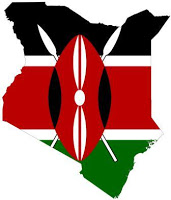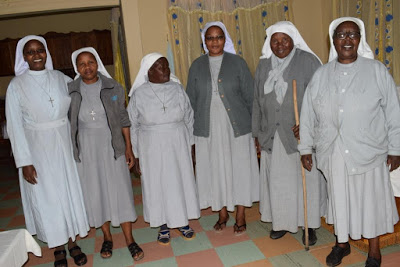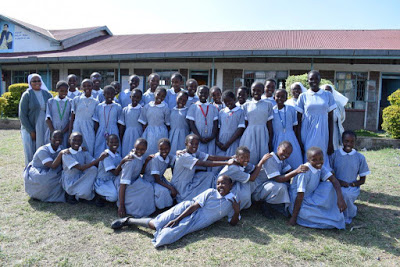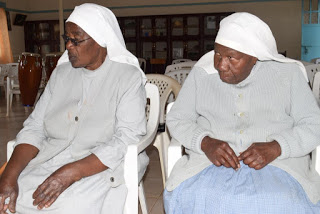KENYA: A Thousand Miles in Search of a Religious Vocation: The Story of Prisca Zulu

Sr. Prisca Zulu is a Zambian nun who joined the Sisters of Mary Immaculate of Nyeri-Kenya, (SMI) in 2004. On 24th October 2018, the Congregation celebrated the Centenary of its foundation at Mathari. Here in Kenya, the AMECEA Online traces the vocational story of Sr. Zulu who left her home to travel more than a thousand miles to follow her vocation against the wishes of her family and friends.
By the time you joined the Sisters of Mary Immaculate, the Congregation had no community in Zambia, how did you find yourself here thousands of kilometres away from home?

I had never heard of the Sisters of Mary Immaculate of Nyeri (SMI). But when I was still in Zambia I came across a pamphlet of their Congregation in one of our bookshops. At that time, I had visited my sister who is also a nun and in my free time I decided to take a walk to the bookshop where I chanced to find this pamphlet.
I read it and became interested because I had never seen an old African sister before. By the way, their oldest Sister is 106 years old and according to their Mother Superior, Sr. Mary Isaac, the sister still does a bit of gardening and is still able to walk 500 metres to the parish church for morning mass. I felt attracted to the Sisters when I read about their charism which was written in the pamphlet ‘The Beatitude of purity” it attracted me very much.
Since the pamphlet had contacts, I started communicating with the then vocation promoter, Sr. Agnes Wambui. After communicating with her for some time, she invited me for a ‘Come and see’ session of their Congregation. At that time, I could not come immediately since I was still in college.
But when I completed, I decided to come. It took me three days to reach the Novitiate at Mwea by bus. I set off from Lusaka in Zambia and had a stopover in Dar es Salaam in Tanzania where I spent a night. I had a challenge in communicating with the people as I did not know Kiswahili, the commonly spoken language there. But in Dar es Salaam, I met a Kenyan business woman who was traveling to Kenya and she helped me.
We reached Nairobi on Sunday night and that time I had no Kenyan currency. I had not taken into consideration the fact that I had to use another currency. Fortunately, I had some US dollars. That night the lady took me to one of the night clubs where she helped me to change the dollars and from there she took me somewhere where I spent the night because I did not know anyone.
The following morning, she came for me and took me to the Matatu (minibus) which was to take me to Nyeri with an instruction that, “The moment you see a hospital, know that you have reached Nyeri Town.” So I boarded and after reaching somewhere I thought I had reached and I alighted from the Matatu. But after asking the people around, they told me I was still far from my destination. So I had to board another Matatu which then brought me direct to the Novitiate.
After alighting along the road, I left my bag by the roadside. I did not know that there are robbers; in Zambia it was very rare to be robbed just like that. I went off to the hospital to find out where the Sisters lived. Luckily I met one of the Sisters who worked in the hospital and she asked me a few questions.
I showed her the letter which the Superior General had written, inviting me for the ‘Come and See’. On my return from the hospital, I found the bag was gone. They then took me to the novitiate where I spent the night. It was on the following day that I was taken to Mathari, where the Postulancy and the Mother House presently are. And this is how I found myself in SMI.
What was the reaction of your parents when you told them that you wished to join a Congregation in Kenya?

My father thought that I was insane. He told my sister who is a nun to talk to me. My sister talked to me but I told her that is where I feel my heart belongs because I was really eager to join the Congregation. Even after being talked to, my father was not satisfied and he went on to seek the intervention of the Rector in the seminary where he taught.
The Father Rector talked to me but still I told him that I have decided to go. So I came to Kenya and spent some months with the Sisters, and then I was told to go back home. They told me I could still come back if I wanted to join them. I went home and stayed for three months and eventually came back to begin my formation.
What was the greatest cultural shock you encountered considering it was a totally different people, culture, language and food?
The first thing I notice immediately was the food, which was completely different. Apart from rice whose preparation is almost same, they had ugali whose preparation was totally different from ours. The ugali from here is very hard while ours is very soft.
Then according to our culture as Chewa people, it is very hard to find a lady doing a lot of work like feeding animals; in my culture that work was strictly for men. But when I joined my formation, we used to feed the animals.
It was somehow very challenging but at the same time I used to find fulfilment in that. I realised that there is no difference in what a man can do and what a lady can do and that all of us have got the potential to do something. And when it came to liturgy, I could not understand anything. However, because the rite of Mass is the same, I was able to follow.
What was the general impression of your parents after your return from the three months’ experience of the ‘Come and see’ in Kenya?
The first thing my father asked was, “Are you happy where you are? Of course they had to look at my physical appearance. Their comment was that I had changed and that I had become so different because when I went home I had a head band – this is a head tie given to young girls who wished to join, or have joined, the Congregation. He questioned if that was what I wanted and when I firmly said ‘Yes’, he let it be.
Honestly, I experienced a lot of discouragement from the other people. They had a lot of reasons for discouraging me from going far away from the family. Others even suggested that I should join the Congregation where my sister is so that I be near my family. However, because my heart was here, I just felt I had to come back.
What has changed over the years since you professed?
The mentality of my people has changed. They were expecting that I could never be happy far away from home. They had expected that I would join a Congregation within the country where my family is and not very far away. Seeing that I was able to undergo my formation and make the profession, it has changed their attitude because they see that I am happy.
Looking at your journey of vocation over the years, what do you find most fulfilling in your vocation?
What I find very fulfilling in my vocation is doing everything for God. If one does things to please people or to meet the expectation of others not God, one can become frustrated. If in the beginning I did not stand firm, if I followed the advice of my family, I would not be here. I would be somewhere else. However, because I was firm in my convictions, I am here up to now and, I really feel happy and fulfilled.

I know that whatever I am doing, I am doing it for God. Each and every day, I strive to win heaven, and that really motivates me. Even when I meet challenges, I look up to Jesus as my model. I know am not the first to encounter that challenge, and that is a source of encouragement in my vocation.
Also, looking at our Foundresses – the way they joined the Congregation and the challenges they encountered, I realise that what I have undergone is nothing compared to what they experienced.
Of course, as a human being I do miss my family. However, the Kenyans here are now my immediate family. The moment I am in great need, the Sisters are always there for me. By the time I inform my biological family, my needs are already met by the Sisters here.
So what really inspired you to join religious life?
Sisters do have more time for praying compared to others. I wanted to be prayerful. I confirmed this when I visited my sister in the convent and I saw that they were prayerful. By the time I joined, I had already completed my training and I had experienced this first hand that out there, there is no much time for one to pray. Above all, I just had an admiration of Sisters; they really inspired me.
Given the challenges you experienced as you discerned your vocation, what advice can you give to parents whose children want to follow a way of life that is probably different from their dreams?
My advice to parents is that if their son or daughter wants to do something, they should give the child an opportunity and help that child to fulfil their dream, especially if it is not something negative. If that aspiration is from their heart, it will not come to be stopped; it will keep burning. Therefore, as parents, it is their responsibility to nurture the dreams and aspirations of their children. At times, children may have doubts but the encouragement they get from parents may build their confidence.
And to young people, it is important for them to listen to the voice within their heart. there are many things that they may have in their their mind but my advice to them is that they listen to the voice within and follow what is in their hearts, and not their minds.
Sometimes in discerning their vocation, young people may look at what the majority are saying and start to follow the path of that majority. They ought not to be afraid to be different and follow a path less followed. If that is what their heart wants, let them stand for it; even if in the eyes of the world they may seem foolish, let it be. They need to ask God for that grace of enlightening and courage. Most of our young people today don’t stick to what they want but rather what others want; they do things just to please their parents and peers.
∽End∽
By Sr. Grace Candiru, MSMMC, ACWECA Communications Coordinator


